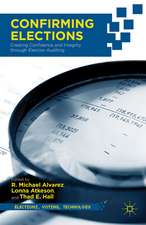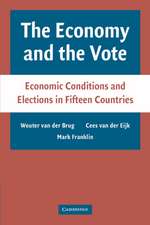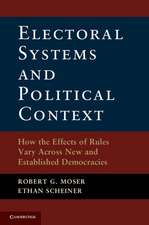Democracy in Divided Societies: Electoral Engineering for Conflict Management: Theories of Institutional Design
Autor Benjamin Reillyen Limba Engleză Paperback – 12 sep 2001
| Toate formatele și edițiile | Preț | Express |
|---|---|---|
| Paperback (1) | 284.56 lei 43-57 zile | |
| Cambridge University Press – 12 sep 2001 | 284.56 lei 43-57 zile | |
| Hardback (1) | 629.48 lei 43-57 zile | |
| Cambridge University Press – 12 sep 2001 | 629.48 lei 43-57 zile |
Din seria Theories of Institutional Design
- 11%
 Preț: 691.66 lei
Preț: 691.66 lei -
 Preț: 323.05 lei
Preț: 323.05 lei -
 Preț: 152.08 lei
Preț: 152.08 lei -
 Preț: 288.80 lei
Preț: 288.80 lei -
 Preț: 283.41 lei
Preț: 283.41 lei -
 Preț: 284.78 lei
Preț: 284.78 lei - 14%
 Preț: 937.61 lei
Preț: 937.61 lei -
 Preț: 284.01 lei
Preț: 284.01 lei -
 Preț: 289.57 lei
Preț: 289.57 lei -
 Preț: 285.75 lei
Preț: 285.75 lei -
 Preț: 282.48 lei
Preț: 282.48 lei -
 Preț: 306.10 lei
Preț: 306.10 lei -
 Preț: 268.89 lei
Preț: 268.89 lei -
 Preț: 305.71 lei
Preț: 305.71 lei -
 Preț: 285.93 lei
Preț: 285.93 lei -
 Preț: 287.48 lei
Preț: 287.48 lei -
 Preț: 203.28 lei
Preț: 203.28 lei - 11%
 Preț: 694.71 lei
Preț: 694.71 lei -
 Preț: 281.49 lei
Preț: 281.49 lei -
 Preț: 280.53 lei
Preț: 280.53 lei -
 Preț: 281.49 lei
Preț: 281.49 lei - 25%
 Preț: 518.31 lei
Preț: 518.31 lei
Preț: 284.56 lei
Nou
Puncte Express: 427
Preț estimativ în valută:
54.47€ • 59.18$ • 45.78£
54.47€ • 59.18$ • 45.78£
Carte tipărită la comandă
Livrare economică 21 aprilie-05 mai
Preluare comenzi: 021 569.72.76
Specificații
ISBN-13: 9780521797306
ISBN-10: 0521797306
Pagini: 232
Ilustrații: 1 b/w illus. 3 maps
Dimensiuni: 153 x 229 x 17 mm
Greutate: 0.38 kg
Editura: Cambridge University Press
Colecția Cambridge University Press
Seria Theories of Institutional Design
Locul publicării:Cambridge, United Kingdom
ISBN-10: 0521797306
Pagini: 232
Ilustrații: 1 b/w illus. 3 maps
Dimensiuni: 153 x 229 x 17 mm
Greutate: 0.38 kg
Editura: Cambridge University Press
Colecția Cambridge University Press
Seria Theories of Institutional Design
Locul publicării:Cambridge, United Kingdom
Cuprins
Introduction: democracy in divided societies; 1. The historical development of preferential voting; 2. The historical development of preferential voting; 3. Centripetal incentives and political engineering in Australia; 4. The rise and fall of centripetalism in Papua New Guinea; 5. Electoral engineering and conflict management in divided societies: (i) Fiji and Sri Lanka compared; 6. Electoral engineering and conflict management in divided societies: (ii)Northern Ireland, Estonia and beyond; 7. Technical variations and the theory of preference voting; Conclusion: assessing the evidence.
Recenzii
'This is a superior work, engaging, important and timely. It concerns some of the most significant issues to theorists and practitioners of democratization, of electoral systems, of voter behavior, and of ethnic-group conflict and methods to ameliorate it. It engages recent debates and provides new evidence and insight' Donald L. Horowitz, Duke University
'This richly insightful and well-researched work is an important contribution to the literature on electoral systems and ethnic conflict management. It is a richly insightful, original and well-researched work. It will attract considerable interest and enthusiasm from academic specialists, as well as from politicians and policymakers looking for institutional strategies for managing conflict.' Larry Diamond, Stanford University
'This is a fine piece of work, a thoughtful, well-researched, and well-presented discussion of how the design of electoral systems … may have a crucial impact on political behaviour at different levels …'. Democratization
'Reilly, with his careful and thorough research, widens our view on the effect of electoral systems on democracy and democratization.' Japanese Journal of Political Science
'… appealing and readable …' Journal of Peace Research
'This richly insightful and well-researched work is an important contribution to the literature on electoral systems and ethnic conflict management. It is a richly insightful, original and well-researched work. It will attract considerable interest and enthusiasm from academic specialists, as well as from politicians and policymakers looking for institutional strategies for managing conflict.' Larry Diamond, Stanford University
'This is a fine piece of work, a thoughtful, well-researched, and well-presented discussion of how the design of electoral systems … may have a crucial impact on political behaviour at different levels …'. Democratization
'Reilly, with his careful and thorough research, widens our view on the effect of electoral systems on democracy and democratization.' Japanese Journal of Political Science
'… appealing and readable …' Journal of Peace Research
Descriere
Reilly analyses the design of electoral systems for divided societies, examining various divided societies.
















